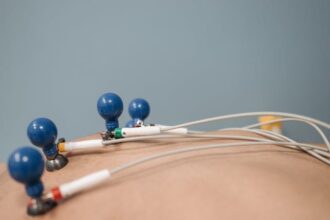New research led by the University of Surrey has revealed that the timing of blood sample collection can significantly influence the outcomes of diagnostic tests for dementia. This study underscores the critical impact of the time of day on the accuracy of dementia diagnostics, particularly in identifying biomarkers linked to Alzheimer’s disease, including a marker promising for early detection.
The research team observed that levels of these biomarkers shift throughout the day, with the lowest levels recorded in the morning upon waking and the highest in the evening. The study specifically highlighted the p-tau217 biomarker, known for its potential in the early diagnosis of dementia, which exhibited substantial variations between morning and evening. These fluctuations were comparable to the progression of mild memory issues worsening over a year.
Dr Ciro della Monica, a research fellow at the Surrey Sleep Research Centre, part of the University of Surrey, and lead author of the study, stressed the importance of time-of-day consideration in clinical diagnostics. He advocated for standardising sample collection times to enhance the precision of dementia diagnoses and the monitoring of disease progression.
The investigation involved 38 participants, including individuals with mild Alzheimer’s, their caregivers, and healthy controls, all residing at the Surrey Sleep Research Centre, which forms part of the UK Dementia Research Institute’s (UK DRI) Care Research & Technology Centre. In a departure from typical clinical practice, where only a single blood sample is usually taken, this study required participants to provide blood samples every three hours over 24 hours.
The findings showed that four of the five biomarkers tested—p-tau217, Aβ40, Aβ42, and NfL—demonstrated significant daily fluctuations. Only one biomarker, GFAP, did not exhibit noticeable variations. The exact causes of these time-of-day differences remain unclear. Still, they may be associated with sleep patterns, meal times, physical posture, activity levels, or other circadian rhythms.
Despite the uncertainty about the underlying mechanisms, the research clearly indicates that the timing of sample collection is a crucial factor in implementing and interpreting plasma biomarkers for dementia. The results advocate for standardising or at least consistent recording of the sampling time to ensure reliability in dementia research and patient care.
Professor Derk-Jan Dijk, Director of the Surrey Sleep Research Centre, UK DRI Group Leader, and senior author of the publication, commented on the implications of the findings. He pointed out that circadian rhythm studies have consistently shown that nearly all aspects of physiology and brain function are subject to diurnal variations. He concluded that applying this fundamental knowledge to dementia research is very promising and could lead to enhanced understanding, improved diagnoses, and better treatment strategies for Alzheimer’s disease.
More information: Ciro della Monica et al, P-tau217 and other blood biomarkers of dementia: variation with time of day, Translational Psychiatry. DOI: 10.1038/s41398-024-03084-7
Journal information: Translational Psychiatry Provided by University of Surrey








